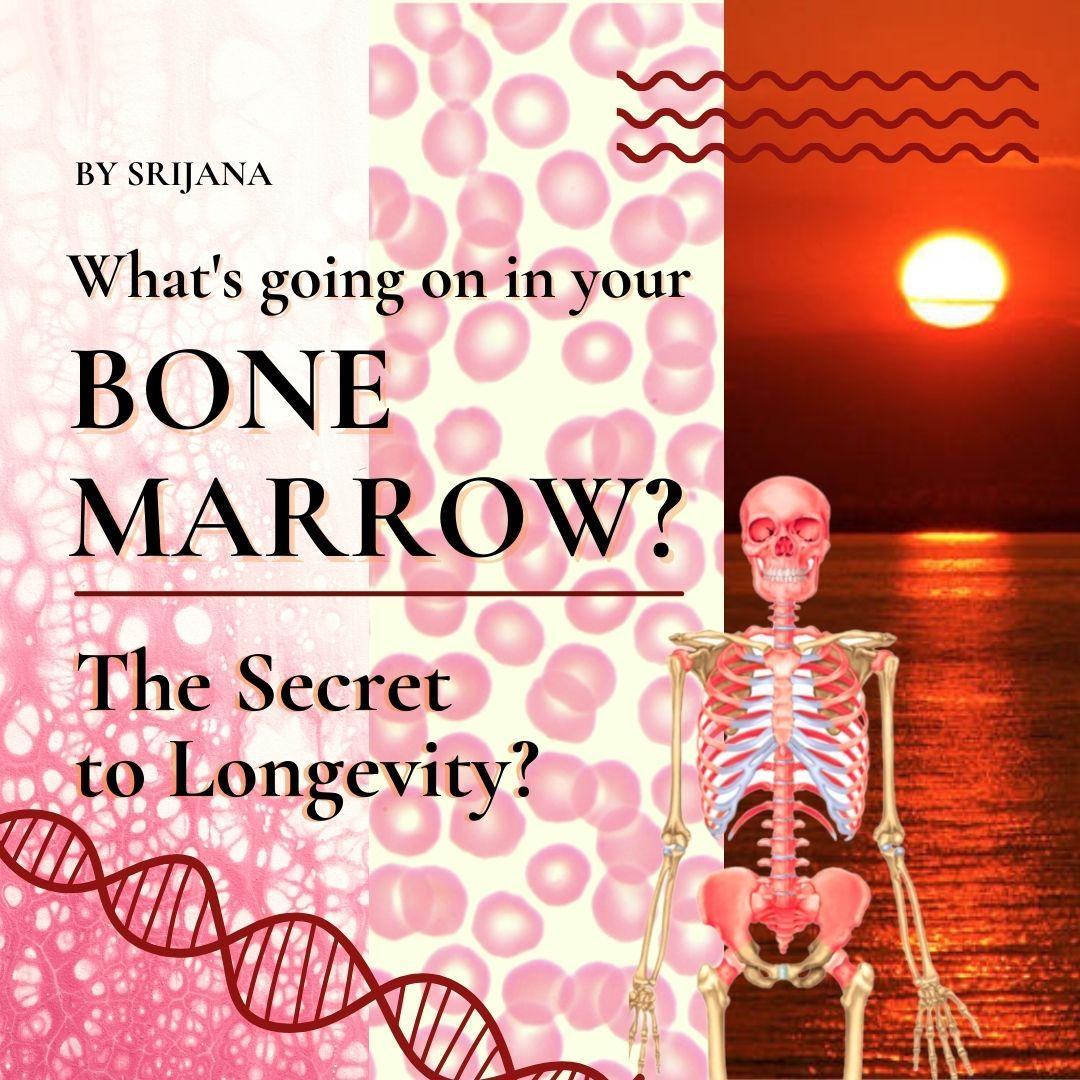Could bone marrow hold the secret to longevity?
There’s a miracle of life going on in your bone marrow every day. This may be the #1 TOP secret to health, cell regeneration, longevity, and immunity. Medical science is learning fast about DNA stem cell creation, differentiation, and how healing happens in the body. A great deal of medical industry literature deals with stem cell replacement for the terminally ill. Much genetic research has been devoted to mRNA shots in the SARS-Covid era. However, this article focuses on optimizing bone marrow function for EVERYBODY. Yes. We can safely say Bone Marrow is one of the deepest roots of our long-term health.
Executive Summary – Is Bone Marrow the Secret to Longevity?
- What is Bone Marrow? It’s a DNA factory of new cells that carry health to your body. Bone Marrow produces 500 billion blood cells per day. At any given time there are an estimated 100 trillion stem cells in adult bone marrow. Many types of cells are created there every day: undifferentiated stem cells, red blood cells, various white defensive cells, and platelets. Stem cell proliferation is directly controlled by the Autonomic Nervous System. That’s why stress and fear patterns like the fight-flight response, reduce stem cell proliferation, leading to gray hair, poor healing, and accelerated aging.
- The Bone Marrow creates the red blood cells that circulate to bring oxygen to the body. Mature red blood cells move out of the bone marrow into the circulatory system to carry oxygen bound to iron in hemoglobin, so body tissues are nourished.
- Immunity Resides in the Bone Marrow. Your immune cells have a memory! The T cells, B lymphocytes, and natural killer (NK) cells actually remember and “store” information about a particular invasion. They can mount a defensive response if the same pathogen is encountered again. This memory of all pathogens resides in your natural immune system, and it endures as long as you are alive.
- What Does Chinese Medicine Say? Bone Marrow is a foundation of your immune system, and one of the Extraordinary Organs, which rule your ancestry and destiny. Chinese medicine sees all Marrow associated with Water and the Kidneys, the storehouse of “Jing”, that essential energy you were endowed from your parents. Like a lifetime savings account, it is important to cultivate your “Jing” to increase your health during your life. Or you can spend your energy in a way that depletes you physically and spiritually. Healing happens at specific times according to the Chinese clock below.
- The Worst Ways to Damage Your Bone Marrow are to fill it with toxins and bots. Like a deep storage area for debris, bone marrow can be damaged by exposure to toxins. The biggest culprits are heavy metals, farming chemicals, vaccines, other toxins, and radiation. Nano particles can accumulate in the fat, severely limiting the bone marrow’s ability to create healthy new cells. Bots and electronic nano particles present in food, air, and water also impair cell production, by blocking the natural intelligence of the immune system.
- How to Support Bone Marrow Health? Clean, nutritious food is essential for cell production that rejuvenates your body every day. Drink plenty of clean water – at least 2 quarts per day. Avoid toxins and junk food, Supplements that support bone marrow function are Chlorophyll, Folic acid, Vitamin C, Nitric Oxide, and Vitamin B12.
1. What is Bone Marrow?
Bone Marrow is a DNA factory of new cells that bring health to your body. Bone marrow is a soft fatty tissue found inside the central spongy part of bones throughout the skeleton. The body’s primary producer of blood cells, bone marrow also produces stem cells, and a LOT of them. The two main types of marrow are red bone marrow, known as myeloid tissue, and yellow bone marrow, known as fatty tissue. Both red and yellow bone marrow are enriched with blood vessels and capillaries.
Stem Cell Production
Bone-marrow is the primary location in the human body that produces stem cells. We begin life with between 6 and 7 trillion stem cells. At any given time there are an estimated 100 trillion stem cells in an adult human body. These potent “blank” cells are undifferentiated and are the very foundation for every organ, cell, and tissue in the human body. A Stem cell is essentially a type of “seed” or “starter” or “blank source” cell that has the unique ability to transform or differentiate into any adult human tissue. The reason why they are essential is that they are the only natural means to repair or replace our damaged tissues and organs permanently. The cells are designed to heal every disease and injury in the body through a targeted delivery protocol. Recent research has also found that intermittent fasting triggers stem cell regeneration.
Blood Production
The bone marrow is said to produce about 500 billion blood cells per day. Red blood cells have a short life span of approximately 120 days, hence they must be continuously replaced by the body. It takes about 7 days for a committed stem cell to mature into a fully functional red blood cell.
The blood circulatory system touches every organ and system in the body. Red blood cells transport oxygen to cells and tissues, platelets travel in the blood to help clotting after injury. White blood cells travel to sites of infection or injury to protect the blood from invasion by unwanted particles. Therefore, the bone marrow is in many ways the root of our immune system.
Where is bone marrow located?
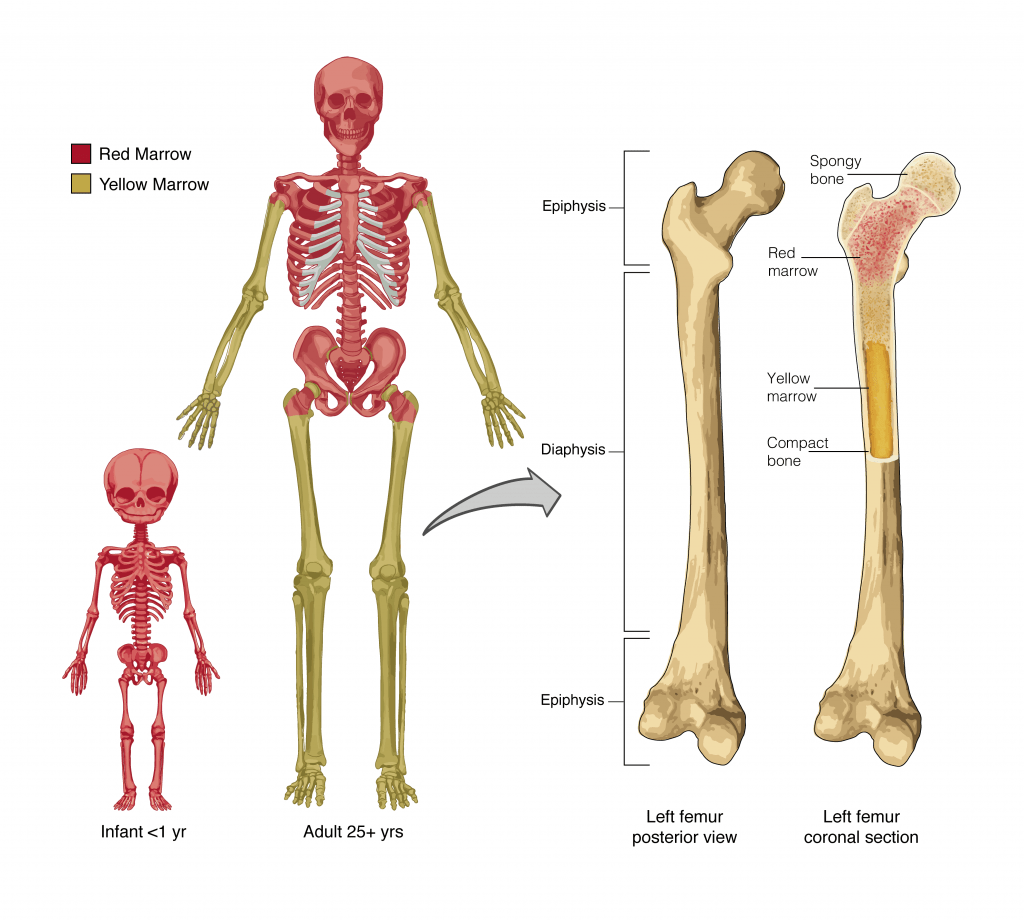
In children, red bone marrow is a busy factory, found in every bone. However, by the age of 25, adult red bone marrow is found primarily in the flat bones, the pelvis, sternum, skull, ribs, spinal column, shoulder blades, and at the top ends of long bones at the shoulder and hip.
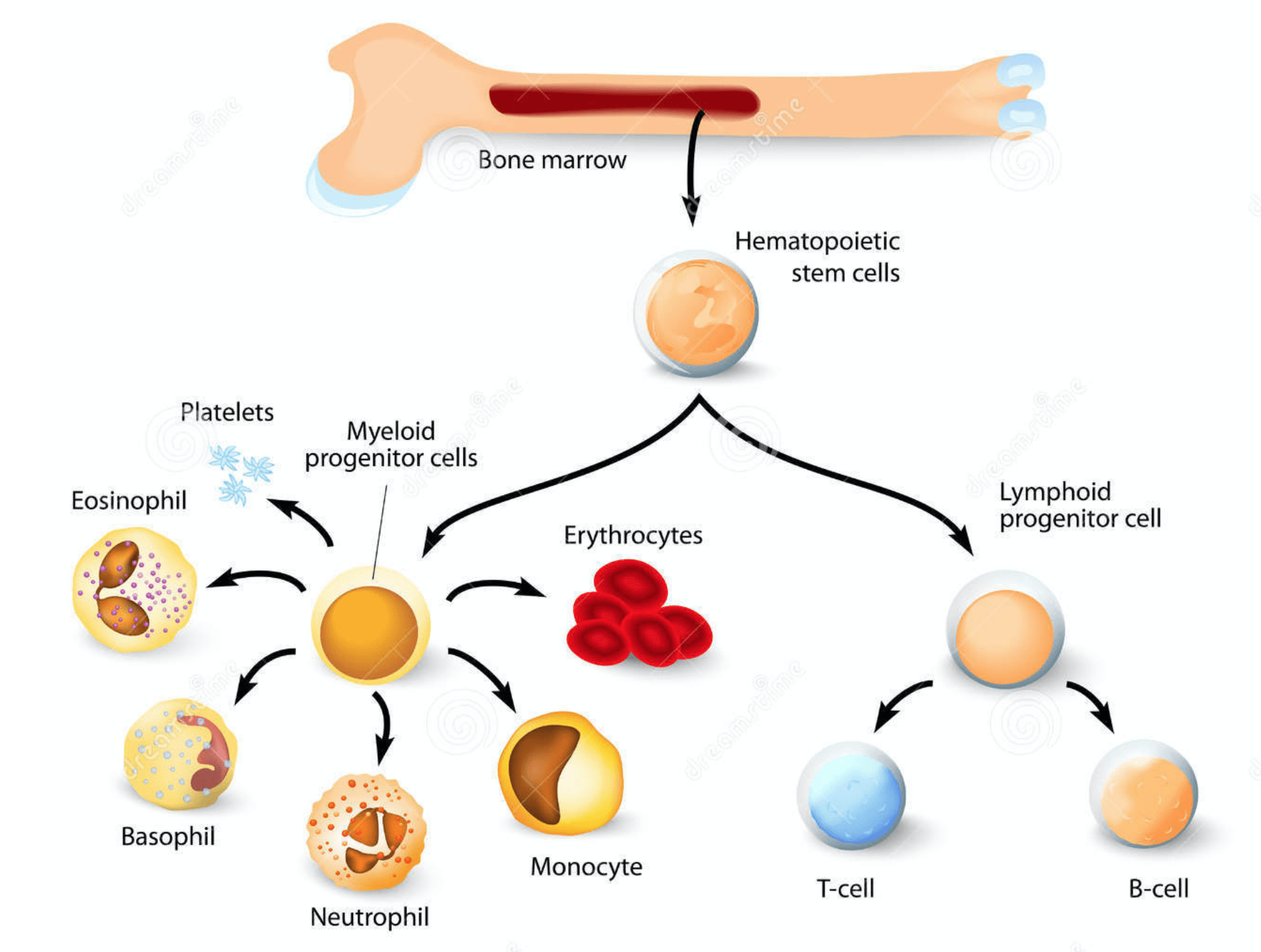
Two types of Undifferentiated cells are created in the bone marrow
- Stromal Stem Cells (Body)– can divide to generate bone, cartilage, and fat cells anywhere in the body.
- Pluripotent Hematopoietic Stem Cells (Blood) – can divide into various types of blood and the immune system, including red blood cells, white blood cells (lymphocytes, neutrophils, eosinophils, basophils, monocytes), and platelets.
1. Undifferentiated Stromal Stem cells:
Stem cells are the fundamental building blocks of the human body. Scientists are still discovering the mysteries of the bone marrow. We know that the bone marrow produces undifferentiated new cells that can eventually be placed anywhere in the body. They could become part of your liver, your heart, or your eyelashes. The body sends them exactly where they’re needed in the body for general repair, or in case of an injury. Newborn children have lots of circulating stem cells that are needed for growth and repair. As we age, the number of circulating stem cells in the body is slowly reduced.
2. Pluripotent Blood Stem Cells:
We also know that the bone marrow produces undifferentiated or “pluripotent” blood cells called hemopoietic stem cells. These cells give rise to many types of blood cells including “Myeloid cells”, a fancy name for a cell that eventually becomes a red blood cell. The other type of hemopoietic stem cells are Lymphoid cells, defensive blood cells such as T cells, B cells, and defensive cells that protect you from pathogens in ingenious ways, usually in the lymph fluid.
Red Blood Cells
Red blood cells (RBCs) transport oxygen in a continuous cycle of pickup and delivery. Hemoglobin inside RBCs binds to oxygen in the lungs. The RBCs are then carried throughout the body in the bloodstream and hemoglobin releases oxygen to the tissues. Hemoglobin molecules consist of iron-containing heme pigment as well as globin proteins. There must be a sufficient amount of iron available in the bone marrow for normal hemoglobin and RBC production.
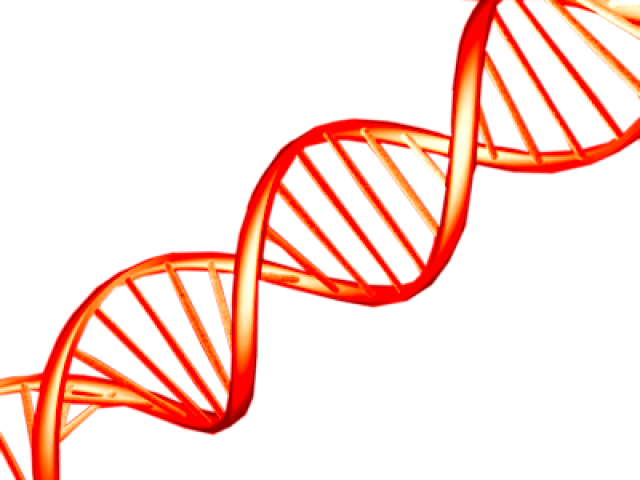
White Blood Cells
The white blood cells help the body fight infections. Each plays a different role in protecting the body from infection. Having too few white blood cells (neutropenia) lowers your immune system and can make you more likely to get an infection. Five types of white blood cells:
- Lymphocytes (T cells and B cells)
- Neutrophils
- Eosinophils
- Basophils
- Monocytes
Lymphocytes are a type of white blood cell. There are two main types of lymphocytes, T cells and B cells. T cells finish maturing in the thymus gland. They help the body distinguish between its own cells and foreign cells like bacteria. B cells circulate in the blood and produce antibodies. Lymphocyte cells are of fundamental importance in the immune system because they determine the specificity of the immune response to infectious microorganisms and other foreign substances. Lymphocytes are roughly 20 to 40 percent of the total white blood cells. They are found in the circulatory system and lymphoid organs, such as the spleen, tonsils, and lymph nodes, where the initial immune response is likely to occur.
Other white blood cells such as Neutrophils, basophils, and eosinophils kill and digest bacteria. Monocytes, which live much longer than neutrophils, also ingest and digest bacteria.
Platelets (Thrombocytes)
Platelets, also called thrombocytes, are fragments of very large cells in bone marrow, and are essential for blood clotting. They are produced by the bone marrow and released to circulate in the blood. When there is an injury to a vessel or tissue and bleeding begins, platelets help to stop bleeding by adhering to the injury site, clumping together (aggregation), and releasing chemical compounds that stimulate further aggregation.
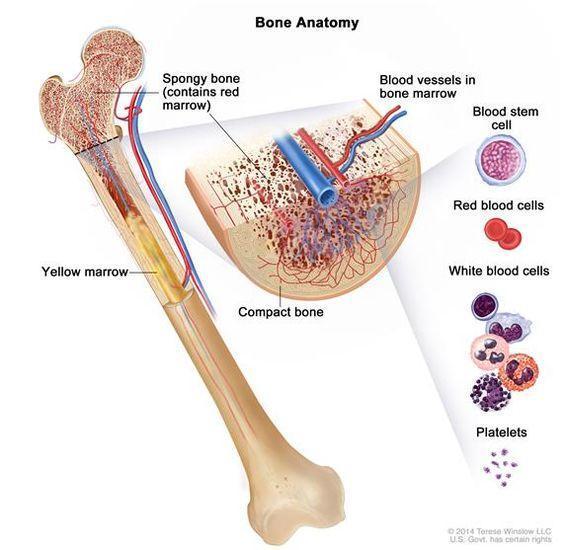
How do Stem Cells know where to go in the body? Not fully understood.
“Stem cell homing” can refer to the inherent ability of stem cells to navigate toward a specific location (such as injury, inflammation, or infection). “Mobilization” means stem cells assemble and move toward specific stimuli or signal direction. “Cell migration” is the inherent ability of cell movement toward a specific area, directional or random. This is a focus of stem cell studies for regenerative therapies. It entails gaining a better understanding of cell behavior, proliferation, and differentiation during healing. The central focus of regenerative medicine revolves around the use of human adult stem cells and induced pluripotent stem cells for cell-based therapy. This inherent ability is not yet fully understood.
2. Blood Cells from the Bone Marrow Bring Oxygen to the Body, the Root of Health
 Everybody knows red blood cells (Erythrocytes) make the blood bright red and are responsible for transporting oxygen from the lungs to all body tissues. Oxygen is needed for every cell to do its job. All cells need oxygen including muscle cells, liver cells, bone, brain, teeth, fat, etc. Most of the oxygen is carried through the body by an iron-containing protein called “hemoglobin.” Oxygen binds to the iron in the hemoglobin, where it stays until it reaches the capillaries (smallest blood vessels). At that point, due to a difference in oxygen concentration, the oxygen moves into the destination cells. In addition to carrying oxygen to all parts of the body, hemoglobin also carries carbon dioxide as “waste” of the cells away from the cells and back to the lungs, where it can be expelled through the air we exhale.
Everybody knows red blood cells (Erythrocytes) make the blood bright red and are responsible for transporting oxygen from the lungs to all body tissues. Oxygen is needed for every cell to do its job. All cells need oxygen including muscle cells, liver cells, bone, brain, teeth, fat, etc. Most of the oxygen is carried through the body by an iron-containing protein called “hemoglobin.” Oxygen binds to the iron in the hemoglobin, where it stays until it reaches the capillaries (smallest blood vessels). At that point, due to a difference in oxygen concentration, the oxygen moves into the destination cells. In addition to carrying oxygen to all parts of the body, hemoglobin also carries carbon dioxide as “waste” of the cells away from the cells and back to the lungs, where it can be expelled through the air we exhale.
For amazing ways to optimize the oxygenation of your blood and body tissues. See my article: “How to Oxygenate Your Blood”.
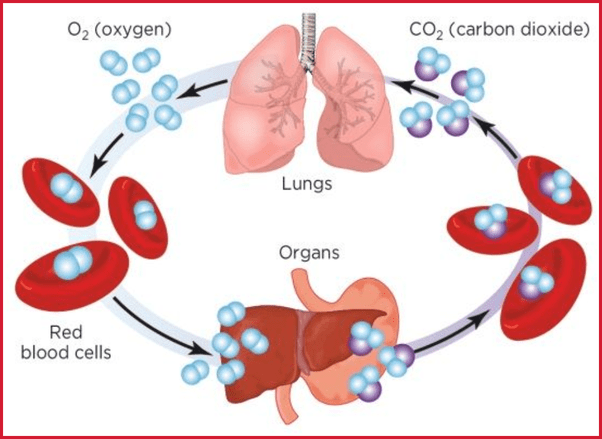
3. Immunity Resides in the Bone Marrow
The Immune Cells Have a Memory!
Immunological memory is a unique property of the immune system. Yes. Your T cells, B lymphocytes, and natural killer (NK) cells can “store” information about a particular invasion and can mount an effective response when the same stimulus is encountered again. This SECOND immune response is quicker and stronger than the primary response. Therefore, it takes a smaller stimulus to trigger a secondary response and, what is more, it may occur even after many years since the first exposure. Immunological memory is an important mechanism that protects the body from bacteria, viruses, fungi and parasites. It plays a significant role in autoimmune diseases and is also crucial in mRNA shots.
Bone Marrow, root of the lymph cleansing system
Bone marrow is a key component of the lymphatic system, producing lymphocyte cells that support the body’s immune system. The bone marrow is the site of production of all blood cells, including white and other defensive blood cells. So, if the bone marrow is not functioning optimally, and white cells are not produced in adequate numbers or with normal function, the immune system will be low, and the body is at risk to a pathogenic virus or bacteria.
Small glands called lymph nodes are located throughout the body. After being made in the bone marrow, the lymphocyte cells travel to the lymph nodes. They can then travel between each node through lymphatic channels, which meet at large drainage ducts near the heart, that empty into a blood vessel.
How Does a Pathogen Enter the Body, and When Do we Feel Sick?
“…Once inhaled by a susceptible individual, the [measles] virus undergoes a prolonged period of silent multiplication, first in the tonsils, adenoids, and accessory lymphoid aggregations of the nasopharynx; later in the regional lymph nodes of the head and neck; and eventually, several days later, it passes into the blood and enters the spleen, the liver, the thymus, and the bone marrow, the ‘visceral’ organs of the immune system. Throughout this ‘incubation’ period, which lasts from 10 to 14 days, the patient typically feels quite well, and experiences few or no symptoms of any kind.” From Dr. Richard Moskowitz’s brilliantly articulated article, The Case Against Immunizations:
Bone Marrow Immunity is Highly Relevant to Covid and the Shots
Although this is a very new area, scientists are beginning to discover important connection in the SARS-CoV-2 era.
It seems SARS-CoV-2 infection induces long-lived bone marrow plasma cells (BMPCs) to be a persistent and essential source of protective antibodies. Individuals who have recovered from COVID-19 have a substantially lower risk of reinfection with SARS-CoV-2. Nonetheless, it has been reported that levels of anti-SARS-CoV-2 serum antibodies decrease rapidly in the first few months after infection, raising concerns that long-lived BMPCs may not be generated and humoral immunity against SARS-CoV-2 may be short-lived. Here we show that in convalescent individuals who had experienced mild SARS-CoV-2 infections (n = 77), levels of serum anti-SARS-CoV-2 spike protein (S) antibodies declined rapidly in the first 4 months after infection and then more gradually over the following 7 months, remaining detectable at least 11 months after infection. Anti-S antibody titres correlated with the frequency of S-specific plasma cells in bone marrow aspirates from 18 individuals who had recovered from COVID-19 at 7 to 8 months after infection. S-specific BMPCs were not detected in aspirates from 11 healthy individuals with no history of SARS-CoV-2 infection. We show that S-binding BMPCs are quiescent, which suggests that they are part of a stable compartment. Consistently, circulating resting memory B cells directed against SARS-CoV-2 S were detected in the convalescent individuals.
“Overall, our results indicate that mild infection with SARS-CoV-2 induces robust antigen-specific, long-lived humoral immune memory in humans.” “Immunity to the Coronavirus May Persist for Years after Getting it, Scientists Find”
“The scientists found that although antibodies decline rapidly in the first four months after infection and then more slowly over the next seven months, they are still detectable at least 11 months after infection.” Source
“Immune system has long-term defenses after mild COVID-19.”
Months after recovery from mild COVID-19, when antibody levels in the blood have declined, immune cells in bone marrow remain ready to pump out new antibodies against the coronavirus, researchers reported on Monday in Nature. Upon infection, short-lived immune cells are generated quickly to secrete an early wave of protective antibodies. As the immune cells die out, antibody levels decline. But a pool of these immune cells, called long-lived plasma cells, is held in reserve after infection. Most of them migrate to the bone marrow, explained coauthor Ali Ellebedy of Washington University School of Medicine in St. Louis. His team obtained bone marrow samples from 19 patients seven months after the onset of mild COVID-19. Fifteen had long-lived plasma cells secreting antibodies against the coronavirus. Five of the 15 had second bone marrow biopsies 11 months after symptom onset and all still had long-lived plasma cells secreting antibodies against SARS-CoV-2. Ellebedy, in a statement, noted that these cells are “just sitting in the bone marrow and secreting antibodies. They have been doing that ever since the infection resolved, and they will continue doing that indefinitely… These cells will live and produce antibodies for the rest of people’s lives.” It is not clear yet whether the same results would be seen in survivors of moderate to severe COVID-19, the authors said. (https://go.nature.com/34dYKB2)
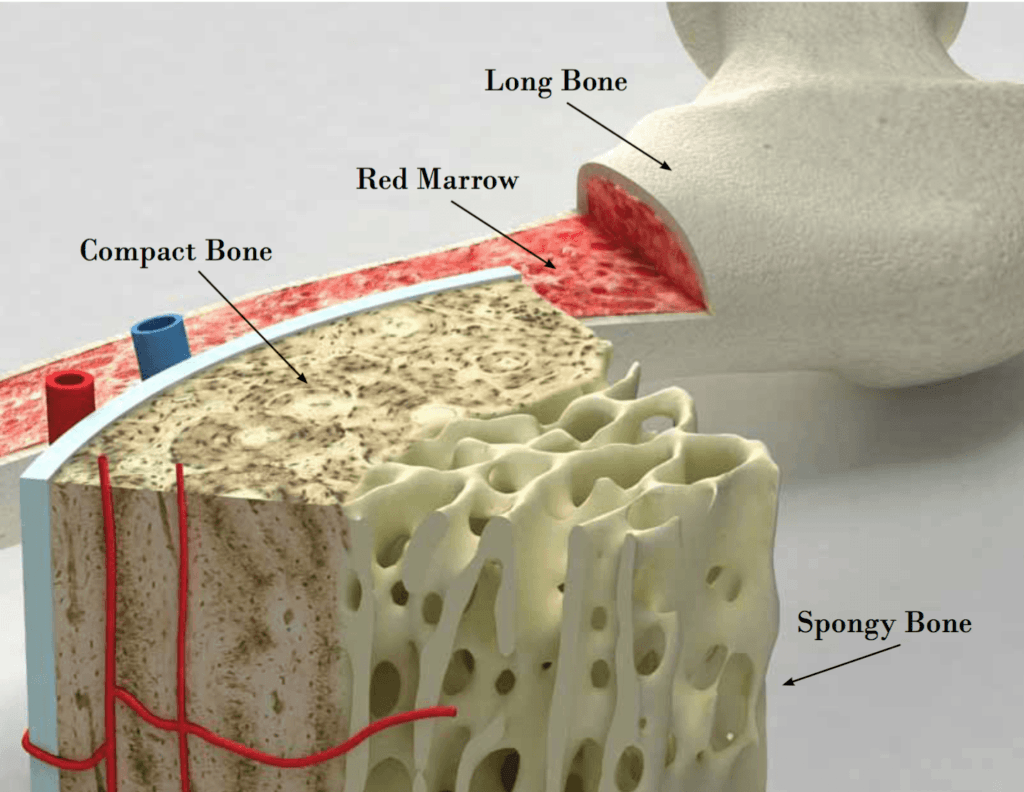 However, we cannot assume that immunity will follow from a shot. In fact, the shot may drive the virus deeper and cause long term chronic problems.
However, we cannot assume that immunity will follow from a shot. In fact, the shot may drive the virus deeper and cause long term chronic problems.
The following is from the Dr Richard Moskowitz article “The Case Against Immunizations”
“It is dangerously misleading, and indeed the exact opposite of the truth, to claim that a vax$-een renders us ‘immune’ to or protects us against an acute disease, if in fact it only drives the disease deeper into the interior and causes us to harbor it chronically instead, with the result that our responses to it become progressively weaker but show less and less of a tendency to heal or resolve themselves spontaneously. What I propose, then, is to investigate as thoroughly and objectively as I can how the vax$-eens actually work inside the human body, and to begin by simply paying attention to the implications of what we already know. Consider the process of falling ill with and recovering from a typical acute disease, such as the measles, in contrast with what we can observe following (the intramuscular) administration of the measles vax$-een.”
Note: This article is not about the shot. It’s about how to support your health. We see there is a cellular memory in the immune system. However it does rain the question that I would ask as a non-scientist. “How can a shot that does not contain the pathogen actually provide immunity of any kind?”
4. What Does Chinese Medicine Say about Bone Marrow?
Bone Marrow is one of the “Six Extraordinary Organs”, which include all Marrow, the Brain, Bones, Uterus, Blood Vessels, and the Gallbladder. The six extraordinary Organs are the first to develop in an embryo, related to your destiny and ancestry. Hence they’re even MORE important than the standard 12 organs. In Chinese Medicine, the bones are considered the deep bedrock of the body memory, intelligence, and wisdom.
Classical Chinese Medicine (CCM) predates the AMA by thousands of years. The “Jing”, or Ancestral Essence, corresponds to the body’s constitution and relates to our genetic material from birth. The Kidney system stores the “Jing” which also supports the brain. Therefore maintaining the health of our Kidneys is fundamental to a healthy Bone marrow, long life and brain function. The brain is also one of the six Extraordinary Organs, and is called the “Sea of Marrow.”
Your “Jing” is the essential energy you were endowed from your parents. Like a savings account in the bank, you can cultivate it to build it and increase your health. Or you can fritter it away and spend your energy in a way that depletes you physically and spiritually. Cellular healing happens all day, and especially at night. The Chinese clock below indicates critical healing hours for each system. Check out the image, and make sure you get your beauty rest!
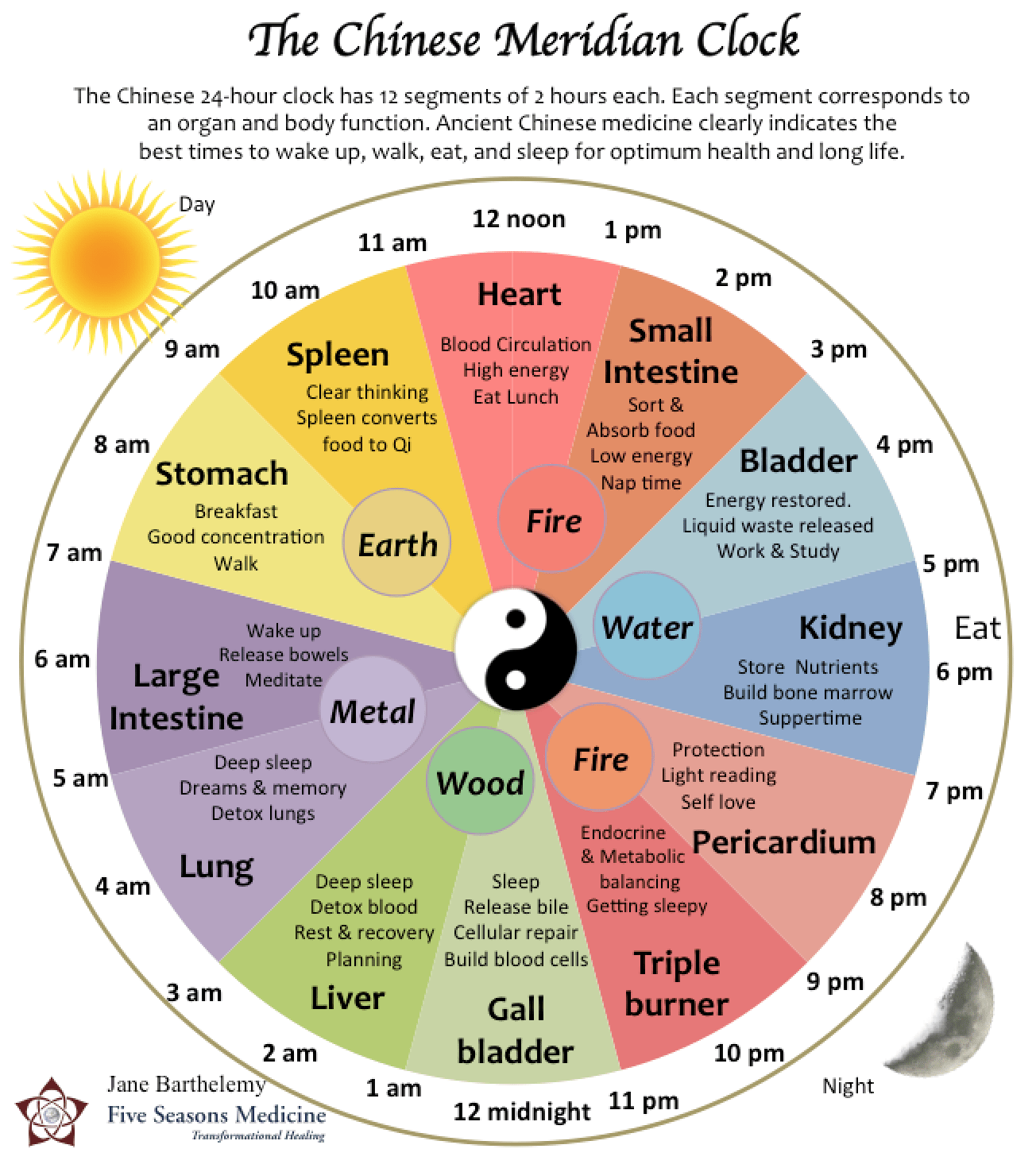 Chinese medicine sees all Marrow associated with the Water Element and the Kidneys. The Kidney system rules the Bladder, Adrenals, Ears, Teeth, Brain and Nervous System, Hair & Graying hair, Bones, Spine, Knees, Urethra, Anus, Sexual organs. The Kidney system also rules the precious “Jing” – the essential ancestral storehouse of energy in the body. In Chinese medicine, the Kidney “Jing” rules sexual vitality. Thus, a weak bone marrow function could potentially damage fertility and sexual health. Dental problems and hair loss are two other signs of weak bone marrow function. It follows that the Marrow nourishes the Brain and Spinal Cord through the “Jing”.
Chinese medicine sees all Marrow associated with the Water Element and the Kidneys. The Kidney system rules the Bladder, Adrenals, Ears, Teeth, Brain and Nervous System, Hair & Graying hair, Bones, Spine, Knees, Urethra, Anus, Sexual organs. The Kidney system also rules the precious “Jing” – the essential ancestral storehouse of energy in the body. In Chinese medicine, the Kidney “Jing” rules sexual vitality. Thus, a weak bone marrow function could potentially damage fertility and sexual health. Dental problems and hair loss are two other signs of weak bone marrow function. It follows that the Marrow nourishes the Brain and Spinal Cord through the “Jing”.
Chinese Medicine sees Marrow as produced by the Kidneys, which also rule the emotion of FEAR. This corroborates with Western scientific findings that see a direct link between stem cell proliferation, PTSD, and stress. Hence when stress levels are high, the body locks into a fight-flight pattern in the body, and sleep may be disturbed. Bone marrow stem cell proliferation will also suffer, resulting in gray hair, poor healing, and accelerated aging.
Bone Marrow Is a Foundation of Your Immune System
Chinese medicine holds that your immune protection from external pathogens depends upon Kidney “Jing” and on your defensive aura called “Wei Qi”. If a person has low Kidney “Jing”, the bone marrow function will suffer, the Wei Qi protection will be weak, and they will have lower immunity to pathogens. This often manifests in a pattern of “constantly coming down with a cold, flu or allergies”. Thus, poor functioning bone marrow will block them from fully realizing their physical and spiritual potential.
TCM was simplified by Mao Zedong, for minimal emphasis on the “Destiny” Organs
It is important to remember that in the 1950’s Mao Zedong had Chinese medicine completely re-organized into a standardized model. The advantages were that it could be easily codified and taught to more people. The new TCM placed emphasis on how to treat the 12 primary channels. It taught very little of the eight Extraordinary Meridians or the six Extraordinary Organs. This reorganization abandoned age-old complexities in diagnosis and treatment, in favor of simple, standard prescriptions, memorized lists and bullets. Even worse, it eliminated the thousand-year tradition of apprenticeship under a true Master who had gleaned his knowledge from decades years of spiritual practice and healing experience.
Esoteric Aspects of TCM have been “cleansed”
The new simplified TCM also disregarded any aspects deemed religious, esoteric, or shamanic in nature in an effort to garner respect from the materialist Western scientific community. Hence, the very existence of the Extraordinary Meridians and Organs touch the deepest destiny and ancestry of an individual. Thus these have always been considered “dangerous” to teach to novices, who might be tempted to implement the delicate alchemy in selfish or limited ways that could bring harm to the patient or their lineage. This style of medicine is exported as TCM (Traditional Chinese Medicine) and has become the pervasive style of Chinese medicine throughout the West. The title “Classical Chinese Medicine” (CCM) distinguishes those practicing without regard to this change.
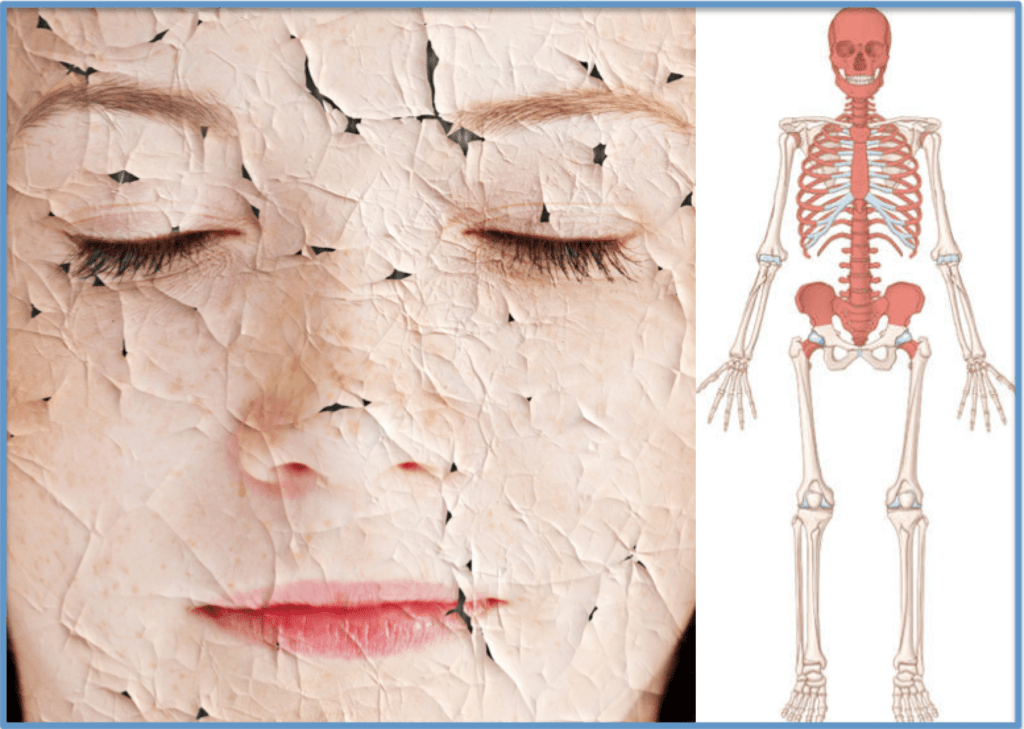
5. Worst Ways to Damage Your Bone Marrow?
“Like the fat deposits in your body, Bone Marrow is a significant depository of toxins. It stores the debris that the body has been unable to eliminate.”
The Bone Marrow is your deep storage of toxins and heavy metals. Yikes! Research shows that toxic chemicals, pesticides, herbicides and heavy metals can accumulate in the bone marrow over time, limiting its function. Mercury has a particular affinity to become deposited in vital organs such as the brain, nervous system, the heart, the liver, kidneys and bone marrow. Studies show that the bone marrow can be damaged by toxic exposure to benzene, pesticides, herbicides, pharmaceutical drugs, mercury, silver, aluminum, and radiation. The result is poor healing and accelerated aging.
Two primary Western diseases associated with bone marrow function are Multiple Myeloma and Myeloid Leukemia (AML). It just happens that my father died of Multiple Myeloma, cancer of the bone marrow that started in his rib.
- High Blood Sugar – Chronic Hyperglycemia, or a diet high in glucose, is associated with β-cell malfunction. Chronic hyperglycemia causes a progressive decrease of β-cell function and mass in type 2 diabetic patients.
- Exposure to Nanoparticles and Radiation, which can turn off genes, or change the natural immune defense system in bone marrow stem cells. MIT researchers modified nano particles make stem cells go to different areas of the body. Bots and nano particles in junk foods, toxic air, and dirty water impair blood cell production, and block the natural intelligence of the immune system.
- Mercury Heavy Metal: Dental fillings, vax$-eens, tuna or other fish that may have high mercury content.
- Aluminum Heavy Metal: Aluminum foil, cookware, deodorants, cosmetics, aluminum cans.
- Exposure to Pesticides and Herbicides: Any toxic substance present in the bone marrow or such a process as the accumulation of TE can affect the entire organism.
- Exposure to toxins, solvents, building materials, pesticides, vaccines, herbicides, benzene, asbestos. Benzene works by causing bone marrow not to produce enough red blood cells, which can lead to anemia. Also, it can damage the immune system by changing blood levels of antibodies and the loss of white blood cells.
- Lack of exercise causes stagnation of the blood and lymph systems.
- Long standing pattern of FIGHT-FLIGHT fear or “Switching” in the nervous system.
- Adrenal exhaustion and pushing yourself when your body needs to rest.
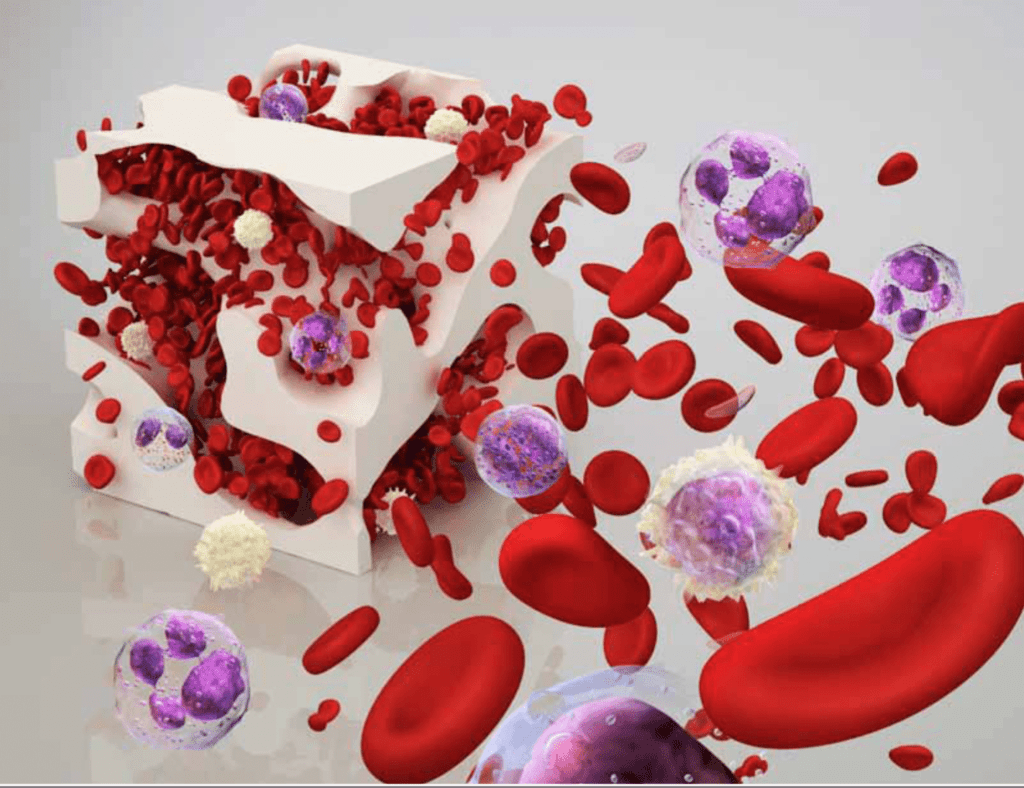
6. How to Support Bone Marrow Health?
Eat Clean Nutrients Essential for Blood Production
- Eat Nutrients for blood cell production:
Folic Acid is essential for the production of new red blood cells in the body. Some medications can interfere with utilization of folic acid and cause anemia. Sources of folic acid include lentils, dried beans, peas, brussels sprouts, banana, corn, beets, pineapple, peanuts, spinach, green beans, sprouts, chickpeas, and brown rice.
Vitamin B12 is needed to make new red blood cells in the body. Prolonged use of certain medications may also interfere with absorption of dietary vitamin B12. Milk, green leafy vegetables, meat, eggs, and fish are good sources of vitamin B12.
Vitamin C can increase the absorption of iron, especially non-heme iron. Vitamin C is rich in citrus fruits, kiwi, strawberries, bell peppers, kale, and mustard greens. Increasing uptake of Vitamin C can cause excretion of folic acid from the body. Take ChlorOxygen Chlorophyll drops for blood building. Chlorophyll, in the form of sodium copper chlorophyllin, was found to promote the proliferation and differentiation of stem cell function and increased peripheral blood white cell and platelet counts, thereby improving immunoregulatory capacity in one study on mice with aplastic anemia.
Chlorophyll, the pigment that gives plants their green color, is part of the process plants use to produce energy through photosynthesis. The molecular structure of chlorophyll is almost identical to that of hemin in hemoglobin, a protein in blood that transports oxygen throughout the body. The only difference in the structures of hemin and chlorophyll is the central atom: in hemin it is iron, while in chlorophyll it is magnesium. Because of the similarities between chlorophyll and hemin, chlorophyll is able to assimilate into the body where it can aid in rebuilding blood cells. Chlorophyll has been observed to increase the speed of hemoglobin regeneration.
Nitric Oxide has multi-layered benefits for the bone marrow. It helps to lower high blood pressure, improves clotting, reduces insomnia, boosts sexual function, brain function, and overall immune function in the blood and body. Foods rich in nitric oxide include especially BEETS! These are delicious in soups, salads, and in drinks as beet powder. Other food sources of nitric oxide include leafy greens, spinach, bok choy, broccoli, and high-fatty wild fish like salmon and anchovies. - Eat a clean Organic diet, avoiding all industrial chemicals, herbicides and pesticides.
- Eat a balanced diet, with plenty of iron, folate, and vitamin B12.
- Drink plenty of clean water. Start with 2 quarts per day, in small quantities
- Have yourself checked for heavy metals, and remove them if necessary.
- Eat homemade bone broth, which builds blood and repairs cellular damage.
- Exercise! Walk every day 30 – 45 minutes.
- Get plenty of deep sleep, and lots of naps.
- Chanting and Singing surprisingly vitalizes the body, moves the blood, lymph, CSF, bones and marrow.
- Practice Qigong movements, especially Kidney forms and Bone Marrow Cleansing forms.
- Qigong shaking 30 minutes a day helps to vitalize the lymph and remove toxins. Have a regular practice of releasing tension out of the body.
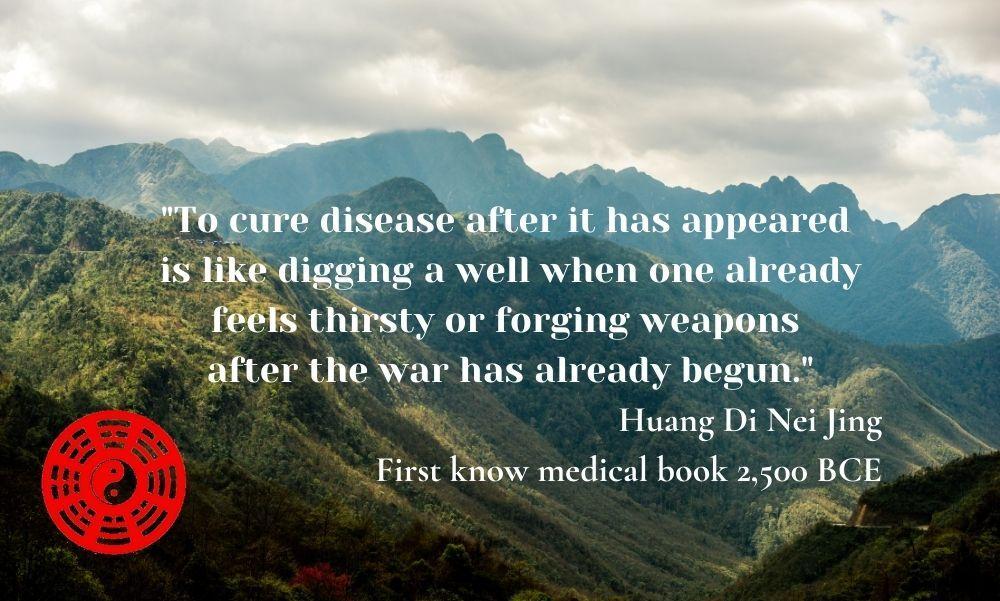
About Srijana:
Srijana, aka Jane Barthelemy, is a prolific researcher, intuitive medium, channel, author, and energy healer with over 50 years experience in Kundalini and Buddhist meditation. She has an MBA and worked as CFO of Rudi’s Bakery for 10 years. Her life path followed many careers including opera primadonna in Italy and owner of a Venetian glass jewelry company. Serious health challenges led her to teach Qigong, Taichi, and to write two healthy cookbooks: “Paleo Desserts” and “Good Morning Paleo”. Her healthy food & lifestyle website JanesHealthyKitchen.com recently won the 2021 CEO Magazine award for the “Best Healthy Food & Lifestyle Blog – North America”. Her upcoming books include: “Heal Your Past Lives” and “Buddha Speaks – Channeled Passages from the Master”. She lives in Bali with her Bhutanese husband Lama D.
Resources:
- http://www.mds-foundation.org/wp-content/uploads/2011/10/BoneMarrowBook.pdf
- http://www.ncbi.nlm.nih.gov/pubmed/21987380
- http://familywellnesshq.com/heavy-metals-sources-toxicity/
- https://www.cancer.gov/types/leukemia/patient/adult-aml-treatment-pdq
- https://en.wikipedia.org/wiki/Myeloid
- https://en.wikipedia.org/wiki/Hematopoietic_stem_cell
- http://www.medicalnewstoday.com/articles/285666.php
- https://www.themmrf.org/multiple-myeloma/what-is-multiple-myeloma/
- http://stemcells.nih.gov/info/basics/4.htm
- Stem cell proliferation is controlled directly by nervous system, scientists find, https://www.sciencedaily.com/releases/2018/10/181017141033.htm
- SARS-CoV-2 infection induces long-lived bone marrow plasma cells in humans https://www.nature.com/articles/s41586-021-03647-4
- https://www.nytimes.com/2021/05/26/health/coronavirus-immunity-vaccines.html
- https://www.gavi.org/vaccineswork/how-answer-long-lived-immunity-covid-19-could-lie-our-bone-marrow
- https://www.reuters.com/lifestyle/science/immune-system-has-long-term-defenses-after-mild-covid-19-children-may-be-key-2021-05-24/
- https://www.cancer.org/cancer/chronic-lymphocytic-leukemia/about/normal-tissue.html
- https://www.medicalnewstoday.com/articles/285666
- https://blog.essense-of-life.com/anemia-foods-that-boost-blood-cells/?#.YPkaeS2cZ0s
- https://pubmed.ncbi.nlm.nih.gov/15286808/
- Accumulation of Toxic Elements in Bone and Bone Marrow of Deer Living in Various Ecosystems. A Case Study of Farmed and Wild-Living Deer, a PDF, animals-10-02151.pdf
- https://www.futuremedicine.com/doi/10.2217/nnm-2018-0076
- https://www.nature.com/articles/cddis2015230
- https://www.statpearls.com/ArticleLibrary/viewarticle/22122
- https://labtestsonline.org/conditions/bone-marrow-disorders
- https://pubmed.ncbi.nlm.nih.gov/514302/
- https://news.mit.edu/2020/nanoparticles-bone-marrow-rnai-1005
- https://www.ncbi.nlm.nih.gov/pmc/articles/PMC5906799/
- https://stemcellthailand.org/6-ways-boost-stem-cells-naturally/
- https://stemcellthailand.org/adult-stem-cells/
- https://www.sciencedirect.com/science/article/pii/S2214031X1300048X
- https://www.ncbi.nlm.nih.gov/pmc/articles/PMC6102609/
- https://www.breathinglabs.com/monitoring-feed/electroporation/a-brilliant-analysis-of-vaccination-by-richard-moskowitz-md-and-homeopath/
- https://www.liebertpub.com/doi/10.1089/ars.2008.2121
- How Stress Turns Hair White: Harvard Study Pants To ‘Fight-Or-Flight’ Response, https://www.wbur.org/news/2020/01/22/stress-white-hair-fight-or-flight



